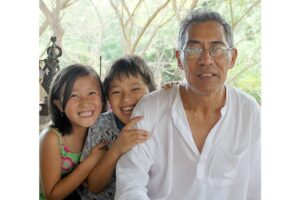Interviews with Prof Samdhong Rinpoche, Kalon Tripa and Dr Lobsang Sangay, Sikyong…
- China’s change is for good: Tibetan PM
Interview with Prof Samdhong Rinpoche for Sify.com (June 2008)
Three years ago, Prof. Samdhong Rinpoche was elected with more than 90% of the votes as the Prime Minister of the Tibetan Government-in-exile in Dharamsala. Though his second term will only be completed in August 2011, Prof. Rinpoche recently indicated that he was ready to leave his place to the younger generation. This was refused by the Dalai Lama who thought “it would send a wrong signal to the world community”. Claude Arpi met the Prime Minister in Dharamsala and discussed some interesting developments in China: the 20th anniversary of the Tiananmen massacre held under tight surveillance in China and the recent publication of the biography of former Premier, Zhao Zyiang who frankly tells his side of the student protests’ story. Another surprising publication is the report of a group of independent Chinese lawyers who squarely put the blame for the 2008 unrest in Tibetan areas on the Chinese satraps in Tibet. With the changing situation in China, Prof. Samdhong Rinpoche sees a lot of hope for the future.
- We are scared, says Tibet PM-in-exile
Interview with Prof Samdhong Rinpoche for Sify.com (July 23, 2008)
“The Three Stops were in Shenzhen and the Four Not-Supporting in Beijing. The Chinese officials said they are very liberal, and since His Holiness has himself declared that he is not engaged in any of these activities, they accept his stand. But now he should actively not-support, meaning he should oppose those who carry on such activities. It means a change in their stand. At this moment we are very much worried about what will happen inside Tibet after the Olympics. What will happen there at the ground level?”
- Lobsang Sangay Interview
Interview with the Tibetan Prime Minister for Rediff.com (May 2011)
On March 10, the Dalai Lama dropped a bombshell: he had decided to stop all political activities. In one way, it solved the problem of ‘succession’ as all the executive powers were now to be concentrated in the elected prime minister. A few days after the announcement, the ballot box spoke out: Dr Lobsang Sangay, born in India 43 years ago and educated first in India and then at Harvard Law School, was elected as the new Kalon Tripa (prime minster).
Many in the Tibetan community saw Sangay as a Tibetan Obama. ‘Change’ was the buzz word in Dharamsala, home of the Dalai Lama in Himachal Pradesh. Even the Tibetan charter (constitution) had to be amended to reflect the change: Article 1 of the charter now terms the Dalai Lama as the “human manifestation of Avaloketeshvara, the guardian and protector of the Tibetan nation,” but with no political power.
(In 2 Parts)
- Violence is not an alternative – March 6, 2006 (with Prof Samdhong Rinpoche) for Revue de l’Inde
The principle of non-violence is appropriate to all the times: past, present and future. For the present and next century, non-violence is the only way for the planet to survive…
- I will always chose monkhood over prime ministership (with Prof Samdhong Rinpoche) – November 23, 2003
India has a very important role. Even without looking at the legal aspect: the Treaty between India and Tibet and the historical relations, even in today’s situation, India is the most appropriate country which should plead with China for negotiations with His Holiness…







